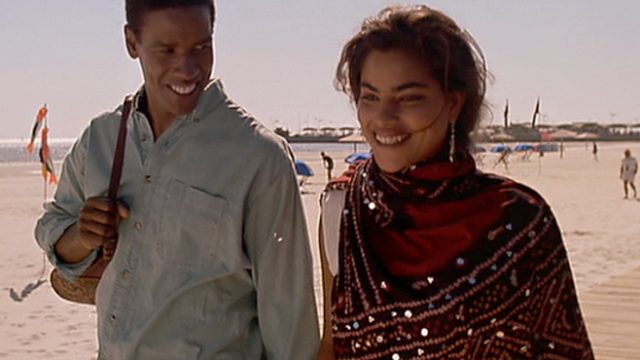I have several more-typical-for-this-column crime films to write up, but in honor of Valentine’s Day, I bring you a well-observed, beautifully textured romance that provides an Austenian treatment of a (mostly) blue-collar, multicultural Mississippi. Mira Nair’s Mississippi Masala doesn’t just build a romance, it builds two tentatively mingling and coexisting communities, one Black and one Indian; the complex and sometimes fraught relationships between those social circles, within them, and between the immigrants and their home countries are all as important as the central love story.
Everything here has substance as well as style. A lot of romance movie characters have no background–they come from nowhere, they have generically quirky jobs, and their families are either Icily Standoffish or Quirky and Warm. You don’t get that with Mina (Sarita Choudhury) and Demetrius (Denzel Washington). They’re much more specific, which lets their relationship development coast along beautifully–this isn’t a dig–on believable chemistry and a mutual appreciation for stability and pleasure. (Nair even makes one of those iconic rom-com “parallel shots of the characters talking on the phone” sequences into something playful and sensual.) You don’t get the feeling that they could never be happy with anyone else, but you do feel like they’ll make a good life together and have a good time in the process.
But again, the individual characterization and the depth of their respective histories, especially Mina’s, are key. Mina is Indian, and an immigrant, but not only was she not born in India, she’s never even been there. She was born in Uganda, as were both of her parents, and her family was forced out of the country in Idi Amin’s mass expulsion of the country’s Asian population. Her identity is too tied to history–and painful history, at that–for her to easily explain it to people; a picnic lunch with Demetrius’s family hits an awkward roadblock when she just can’t find the words. Yet as the movie explicitly points out, Demetrius’s community could potentially understand Mina’s just fine. Commonality, one of the basic tools of empathy, is right there. Demetrius and Mina use it effortlessly–but not everyone in their lives can do the same.
In part, that’s because empathy can be too painful. Mina’s father, Jay (Roshan Seth), was passionately in love with his home country–he always identified as Ugandan before Indian, and as a lawyer, he often defended Ugandans against Indians, making him none-too-beloved in local Indian circles. Then he was told–and the message was even amplified by his friend, someone close enough to be seen as a brother–that he no longer belonged there. Years later, he’s still scarred by that fundamental rejection, filled with an unfading sense of grief and betrayal, and he believes he sees Mina repeating his mistake. She can believe what she wants, he tells her, and the ostensible melting pot of America tells her, but at the end of the day, she still won’t belong. Race and ethnicity will always be walls that keep people in their own tight clusters.
There’s an exuberance to the mid-credits shots that show Mina and Demetrius celebrating, dancing and twirling, happy in their love, but the real pathos of the ending comes when Jay finally goes back to Uganda. Mississippi Masala requires that both the exuberance and pathos share screen-time, and it’s better for it. It’s a rare movie that features a deeply felt understanding of and appreciation for history, community, and tradition–and an equally deeply felt understanding of why sometimes those things have to be left behind. Nair has no problem showing that different cultural and personal values can hold true for different people. Here, as in her other films, like The Namesake, there’s more than one way to make a happy (or unhappy) life.
Mississippi Masala is streaming on the Criterion Channel.

